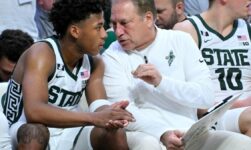The NCAA announced Tuesday that long-time president Mark Emmert, 69, is stepping down from his role with the association. Emmert, who has been steering college sports’ top organization since 2010, will remain in his position until a new president is hired or until June 30, 2023, whichever comes first.
“Throughout my tenure I’ve emphasized the need to focus on the experience and priorities of student-athletes,” said Emmert in a statement. “I am extremely proud of the work of the Association over the last 12 years and especially pleased with the hard work and dedication of the national office staff here in Indianapolis.”
The decision for Emmert to leave the NCAA came through mutual agreement between the president and the NCAA Board of Governors, according to a press release. It comes as the college sports landscape is undergoing seismic shifts with players being granted rights and compensation never experienced before.
The NCAA also ratified a new constitution this past January with the association set to undergo a restructuring that will ultimately see it play less of a forward-facing role than it has since its formation.
“With the significant transitions underway within college sports, the timing of this decision provides the Association with consistent leadership during the coming months plus the opportunity to consider what will be the future role of the president,” said John J. DeGioia, chairman of the NCAA board. “It also allows for the selection and recruitment of the next president without disruption.”
Emmert became a lightning rod for criticism due to several missteps including the slow pace in which the NCAA instituted the policy that allows players to profit off of their name, image and likeness. The NCAA picked up the pace on the NIL revolution only after several states passed laws allowing the practice on their own. Despite the mismanagement of NIL legislation, the board awarded him a contract extension through 2025 just 364 days prior to this announcement of his departure. His salary was a reported $2.7 million per year at the time the extension was announced.
Emmert was also at the helm when the NCAA was involved in the antitrust case in the United States Supreme Court. It lost a 9-0 ruling last year that subsequently allowed players to receive minor perks including education-related items such as laptops, internships and post-graduate opportunities generated through their time as college athletes.
“The NCAA’s business model would be flatly illegal in almost any other industry in America,” Justice Brett Kavanaugh said. “It is highly questionable whether the NCAA and its member colleges can justify not paying student-athletes a fair share of the revenues.”
Emmert was also in charge during the scandal involving the disparity of resources between the men’s and women’s NCAA Basketball Tournaments, incidents that led to several high-profile programs being placed on NCAA probation, the mismanagement of the Nevin Shapiro case at Miami and the FBI investigation that has gripped the men’s basketball world for a half-decade.
His performance as the head of the NCAA has been so mediocre that it prompted CBS Sports’ senior writer Dennis Dodd to write that the organization itself could follow “amateurism” and suffer an untimely death.
Emmert took over the NCAA on Nov. 1, 2010. Prior to that, he served as president of the University of Washington (2004-10) and chancellor at LSU (1999-2004). He received a bachelor of arts degree from Washington and earned a master’s in public administration and PhD from Syracuse University.




